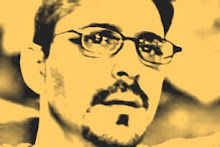In With the Out Crowd
Now that the noise has died down a bit, to post anything on Dan Hoy’s Flarf essay seems really unnecessary. I’d planned on discussing some of the larger issues at stake in Hoy’s piece, such as his quiet socio-materialist critique of a digital hermeticism that, supposedly, bloggers suffer from on a regular basis. His critique—if you want to call the suggestions of a few comments a “critique”—is really pointed at Baudrillard’s notion of simulacrum, which, in a nutshell, says that the fake has become more real than the real. In other words, at some point Hoy suggested that hermetic digital communities had become more real than brick-and-mortar (I just mistyped “mortar” as “mortal”) communities that both support and foster real social interaction. If I understand the essay correctly, he’s of the opinion that poets need to quit “fucking around” on the internet and get out into the real world more often. There are economic considerations as well here, because, as most bloggers realize at this point, many blogs are hosted, for free, by Google. I could have misread the essay at points, but I think he was fairly clear about all this, despite the fact that, to the best of my memory, he doesn’t directly tap Baudrillard.
The ramifications are knotty. Who’s to say what, precisely, an internet community entails? Is there such a creature? Is this a matter of simulacrum? What is a “community”? Don’t reading communities overlap or articulate themselves to one another, in a multiplicity of ways, by way of the very real people that create them? And what is the status of authority in such communities? Should the methodology of Flarf indicate how one should read the poems? If the notion of a singular (and methodologically authoritative) community is in question, then how can one speak of the hermetic? Flarf, if you consider it as a poetics, seems to support methods of interpretation that are far more open than Hoy himself lets on, especially when he quietly claims that the very “community” of poets that create such poetry are themselves, each to each, insulated. And what about the power relations of such communities? Do they differ from brick-and-mortar communities? Is the digital community actually part of a real community? Or part of real communities? How is communication—and the ploys for power that tend to transverse the dialogical—complicated by digital interactions? (How is that last sentence way too complicated?) If we take Hoy’s rationales at face value, then all these questions should play a fairly interesting and important role in determining what’s really up with Flarf.
I don’t mean to be unfair to Dan Hoy. I thought he wrote an insightful essay, although, really, it could have been much more rhetorically condensed, which probably would have shut the mouths of quit a few critics. Generally speaking, I share his skepticism about the hermetic status of digital or internet communities, especially that of the Flarfists, although the conclusions that I’ve come to are provisional, whereas Hoy presents his opinions as though they’re written in Ozymandian stone. In other words, Hoy’s rhetoric borrows one of the worst characteristics of New Criticism, viz., to take an interpretive moral high ground (which tends to generalize or universalize a stance) and bludgeon those who disagree with you. This is human agency at its worst, which is unfortunately supported by many academic communities that, through such teaching, support its own brand of linguistic hermeticism. Don't get me wrong, though. I’m all for fustigation, but only if I’m attacked. Again, all this refers to the tone of his rhetoric. I find that the interesting part of Hoy’s essay points more to issues with “clubs” or “in-crowds”—phrases one could translate into “reading communities” a la Fish—than to overt issues with methodologies, for both have quite a bit to do with the subsequent issue of textual reception and, in turn, textual interpretation.
How seriously, really, are we to take a poetry dubbed “Flarf,” anyway? The questions that we raise may be more interesting and important, although less amusing, than the poetry itself.
Adieu.

